 Headline News
Headline News
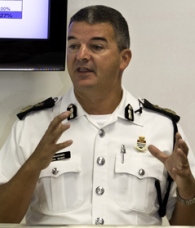
Student reveals Cayman ordeal on web
 (CNS): A young student who was stabbed in the stomach while he was visiting the Cayman Islands on a study abroad programme has revealed his ordeal to his college’s publication and website. In the wake of the stabbing last month, the police commissioner had criticised the local media’s reporting of the incident, saying it had been sensationalised as a robbery when there was no evidence to suggest it was. Speaking to The Pendulum (Elon University’s student newspaper), Brian Andrews said he believed the motive was robbery but because he was able to sprint away quickly the robber didn’t get anything. At a recent public presentation David Baines suggested that the incident was nothing more than a fight. (Photo Dennie Warren jr)
(CNS): A young student who was stabbed in the stomach while he was visiting the Cayman Islands on a study abroad programme has revealed his ordeal to his college’s publication and website. In the wake of the stabbing last month, the police commissioner had criticised the local media’s reporting of the incident, saying it had been sensationalised as a robbery when there was no evidence to suggest it was. Speaking to The Pendulum (Elon University’s student newspaper), Brian Andrews said he believed the motive was robbery but because he was able to sprint away quickly the robber didn’t get anything. At a recent public presentation David Baines suggested that the incident was nothing more than a fight. (Photo Dennie Warren jr)
At the Chamber’s ‘Be informed’ series last month the commissioner accused the local press of reporting the incident incorrectly. “There was an incident last week where it was reported …’Tourist robbed and stabbed on Seven Mile Beach’ when we had not confirmed that account,” Baines said. “The other version that says intoxicated man attending nightclub at midnight, where there was a fall out with boys over girls … doesn’t make headlines … and doesn’t start with the word tourist.”
However, not one single local media outlet across the island had used the word “tourist” or “robbed” in relation to the report. The reports mostly referred to a visitor being assaulted and that police were investigating the incident as per the release circulated by the RCIPS press office.
Condemning the media over the non-existent reports, Baines wondered how many times we needed to “shoot ourselves in the foot” but then denied it was about covering anything up.
“It’s about giving facts, then people can make the right decision,” he told the Chamber. The commissioner said that when people put in the words ‘tourist’ and ‘Cayman’ into search engines it would come up with “tourist robbed” because the incident had not been reported factually by the local media, even though this was not the case.
The story has now been reported on the web by the victim, who spent two nights in hospital here and clearly believes he was the victim of an attempted robbery.
“I assume (robbery) was the motive," Andrews told his local paper. "Right when he lunged, a lot of adrenaline took over. I was able to spin away quickly and spring away. Luckily nothing was taken from me." He mentioned nothing about a dispute occurring at Calico Jacks, which is where the incident occurred, but said he had gone outside the bar to call his girlfriend when the men approached him.
Andrews was in the Cayman Islands on a programme where he and another 21 students were spending their winter term studying at the University College of the Cayman Islands (UCCI), a programme the local university is pushing as “educational tourism” and it was the first time that Elon had offered the overseas study.
In a release from UCCI, Dr Art Cassill, Chair of the Department of Accounting and Finance at Elon, said that the idea originated from one of the parents whose children are attending the university and who regularly visits the island on business.
“The Winter Term Study Abroad programme at Elon University is designed to provide our students with knowledge of the global environment from business to culture and society. While some of the Study Abroad courses reflect objectives on general studies, ours is designed specifically for accounting, finance, management and other majors related to business disciplines,” said Dr Cassill. “The more we looked at it, the more it made sense for our students to be exposed to a truly international financial services centre in this part of the world.”
UCCI President Roy Bodden also noted it provided the opportunity for local students to meet college students from outside the Cayman Islands.
“Elon’s visit to UCCI was an opportunity for them to learn from UCCI faculty and students about Caymanian history, society and economy. UCCI students, for their part were able to broaden their understanding of the United States. The visit was mutually beneficial and plans are in place for next year when it is hoped that UCCI students can visit North Carolina on an exchange programme,” he added.
See local media reports on the incident here and here and university report

Public asked to join search
 (CNS): Officers involved in the search for Anna Evans are asking the wider public to search their own land and outbuildings for the missing landfilll worker. It has now been 12 days since the last confirmed sighting of Anna Evans and despite extensive searches with the assistance of specialist canine units and dog handles there is still no sign of the 37 year old mother. For several days police officers and volunteers have searched the site and surrounding areas but with no sightings the search there is now completed and the specialist team has returned to the US. Police are now in the process of searching outlying areas of the Island for any clues that might help them find Anna who was last seen around noon on Thursday 27 January.
(CNS): Officers involved in the search for Anna Evans are asking the wider public to search their own land and outbuildings for the missing landfilll worker. It has now been 12 days since the last confirmed sighting of Anna Evans and despite extensive searches with the assistance of specialist canine units and dog handles there is still no sign of the 37 year old mother. For several days police officers and volunteers have searched the site and surrounding areas but with no sightings the search there is now completed and the specialist team has returned to the US. Police are now in the process of searching outlying areas of the Island for any clues that might help them find Anna who was last seen around noon on Thursday 27 January.
Officers also said that Anna’s cell phone, believed to be a black Nokia 1660, is also still missing.
With the search now opening up across the island police hope that property owners may be able to help the RCIPS.
“There is a huge amount of land to cover,” said Acting Superintendent Richard Barrow. ”That’s why we are asking communities throughout Grand Cayman to join together today and join us in the search for Anna. We want everyone to spend some time searching their outbuildings and their land for any sign of her. If, during the search, you notice anything unusual or suspicious please let us know.”
Anyone with information that might assist the enquiry team is asked to call the dedicated hotline 526-0911.
Tourists mugged at beach
(CNS): Following revelations on a tourist blog site, the RCIPS has confirmed that a couple visiting the Cayman Islands from the United States was robbed in broad daylight on Barefoot Beach in East End on Monday lunchtime. Police said that Bodden Town detectives have launched an enquiry in the wake of the crime, which occurred around noon. The man and woman parked their hire car in a pathway off the Queens Highway next to Barefoot Beach and a short time later they were threatened by three robbers while sitting on the beach.
Police said the couple was suddenly confronted by three men who all had their faces covered by t-shirts, two of which were armed with a baseball bat and a knuckleduster. One of the men grabbed the male tourist, placed him in a headlock and demanded cash and the victims handed over a wallet containinga small amount of money.
As the suspects were making off from the scene they smashed the window of the couple’s hire car with the baseball bat and stole a camera.
Police said the couple were not injured in the incident but have been left shaken by the ordeal.
The suspects are described as follows; One was approximately 17 years old, 5 feet 7 inches in height, dark complexion. He was wearing a knuckleduster and a dark blue NBA jersey. The second was about 5 feet 10 inches in height and approximately 165 pounds wearing short pants and carried the baseball bat. The third was said to be about 6 feet in height, approximately 165 pounds and wearing a white shirt and short pants.
Detective Sergeant Dwayne Jones, of Bodden Town CID, said, “This is a very remote location and it’s extremely unusual for an incident like this to take place in the area. Although the location is out of the way it is entirely possible that someone travelling on Queens Highway saw the suspects either before or after the incident. If anyone has information that could assist the enquiry they should call Bodden Town CID on 947-2220 or Crime Stoppers 800-8477 (TIPS).”
The Commander of the Eastern Districts, Chief Inspector Martin Bodden Jr., has confirmed that there will be increased police patrols in the area.
The couple, who went to the Reef Resort in East End, wrote about the incident on a tourist web-site yesterday where they thanked the staff there who helped them contact the police.They said the RCIPS had responded promptly and acted in a most professional manner.
“ I felt like we were in an episode of CSI with all the fingerprinting and DNA swabbing that was done,’ the visitors revealed, adding that everyone was “appalled and shocked” that this could happen in East End. “A sad sign of the times on Grand Cayman," the couple added.
Cruise port scales down
(CNS): As plans for the development of the George Town cruise berthing facilities move ahead with a new partner, the chair of the Port Authority has said that it now has a very different scope from that proposed by Dart. Local contractor Royal Construction with its partner, marine contractors GLF, is planning a scaled down proposal that will be financed on cruise fees rather than through an expansive upland element. DECCO, Dart’s contractor, pulled out of project at the end of last year after the developer was unable to reach an agreement with government over the terms of the lease, on which it was intending an extensive upland development that would finance the whole project.
As the Royal/GLF proposal is considerable less complex or ambitious, focused on the two cruise piers – four berthing docks — and an upland terminal, costs are expected to be considerably less than $150 million. This means the contractors will in turn have a considerably smaller shortfall to make up between the cost of the project and the cruise lines guaranteed passenger fees. Although it is not yet certain how the contractor will make up the shortfall, passenger arrivals are likely to far exceed the figures which the cruise lines would be able to guarantee as a result of the increase in cruise passengers generated by the development.
Chair Stefan Baraud told CNS that negotiations with the cruise lines were now going well as they are all very keen for the Cayman Island to take on this project and develop the facilities. With substantially different plans, the contractors will also be looking at the design and construction methods for cost savings on the original estimates in order to get the basic berthing facilities and terminal completed in the first instance.
“Significant progress has been made and the contractor is moving at a pace that makes me confident that the project will be underway this year,” Baraud added. He said the next major milestone was on 17 February when the new plans for the berthing docks will be tested at the Star Centre in Fort Lauderdale on the simulation, mock-up in various weather conditions and circumstances.
The other major issue is the Environmental Impact Assessment. The chair said that Royal/GLF are already talking to the Department of Environment and the next stage will be to see if the work done by Dart is relevant and sufficient for this particular development. Baraud said that as yet the EIA which was undertaken by Dart has not been handed over as there are still commercial issues relating to that.
Without the deep pockets of Dart, the Royal/GLF partnership will be securing outside financing in order to begin the project, which the chair said should be in place before the end of next month and if all goes well with the simulation exercise and the EIA, the change in developer does not mean a dramatic change in time line and Baraud said he is still anticipating that the project will break ground this summer.
Getting the construction underway would be a significant boost, not just for the local tourism industry but the construction sector as well, as the developer estimates there could be as many as 200 jobs going for local people.

UK – CI relations improving
 (CNS): As the country’s premier meets with the UK overseas territories’ minister today in London to discuss Cayman’s public finances he does so against a backdrop of much improved relations between the two countries. The governor, Duncan Taylor, described the situation between the UK and CI as a very “tetchy relationship” when he arrived in January 2010 but said last week that the current relationship is now a very cordial one. The governor said it had been one of his priorities on arrival to improve the communication between his office and the locally elected members of government when he took up his post and was now pleased with the working relationship he enjoyed with his Cabinet colleagues.
(CNS): As the country’s premier meets with the UK overseas territories’ minister today in London to discuss Cayman’s public finances he does so against a backdrop of much improved relations between the two countries. The governor, Duncan Taylor, described the situation between the UK and CI as a very “tetchy relationship” when he arrived in January 2010 but said last week that the current relationship is now a very cordial one. The governor said it had been one of his priorities on arrival to improve the communication between his office and the locally elected members of government when he took up his post and was now pleased with the working relationship he enjoyed with his Cabinet colleagues.
“I am very happy with the relationship I have here at the moment with the local government,” Taylor revealed at a recent press briefing. “We have a good working atmosphere within Cabinet. We don’t always agree on everything – as that would be impossible – but we are quite good at discussing differences and how we can approach things and I am very happy with that part of my job.”
He acknowledged that while governors in other overseas territories were still having problems with their working relations, things had improved all round in Cayman when it came to the communication between here and London.
When he first came, he said, the rhetoric regarding relations was “very tetchy” but now things were in a very positive place and the British government was working well with the Cayman Islands. Taylor said he believed the new minister, Henry Bellingham, had brought a very positive note into the relationship and that previous meetings between McKeeva Bush and the FCO minister had gone very well.
Bush is due to meet with Bellingham again today at the FCO, where he will be discussing the three year plan, which was submitted to the UK in order to gain approval from the British government to push the country’s borrowing beyond the limits of Cayman’s own financial management laws.
The UK approved some CI$155 million in further borrowing but recent revelations by the premier that the country may be facing a surplus this year instead of an anticipated deficit means government may no longer need to extend its debt — a message likely to further sweeten the relationship between the two countries.
In a statement to the nation last week, Bush said that unaudited figures suggest at the fiscal year half way mark that government may achieve a surplus of $17m instead of an expected $14m deficit by the end of the 2010/11 budget year. He said the turnaround in public finances was no accident but was a “direct result of a conscious effort” across government and the wider public sector to restrain expenditures.
The continued reduction in government spending is bound to win approval fromthe UK Conservative government, which is currently making unprecedented cuts its own public sector.
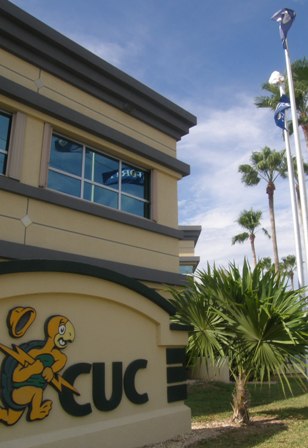
CUC faces more damage
 (CNS): In the wake of the explosion at CUC last month the local power firm has suffered another major mechanical failure this weekend. The firm said no one was injured on Saturday, 5 February, when a Mirrlees 7.59 generator, installed in 1991 and due for retirement next year, failed. The damage was contained to the aging unit but the combination of the two incidences is likely to be of significant financial impact, the firm revealed on Monday. As the company battles with a number of generating problems, CUC officials have warned of further unplanned maintenance, which is likely to lead to rotating customer outages of up to an hour each in duration as a result of the firm’s short term capacity problems.
(CNS): In the wake of the explosion at CUC last month the local power firm has suffered another major mechanical failure this weekend. The firm said no one was injured on Saturday, 5 February, when a Mirrlees 7.59 generator, installed in 1991 and due for retirement next year, failed. The damage was contained to the aging unit but the combination of the two incidences is likely to be of significant financial impact, the firm revealed on Monday. As the company battles with a number of generating problems, CUC officials have warned of further unplanned maintenance, which is likely to lead to rotating customer outages of up to an hour each in duration as a result of the firm’s short term capacity problems.
Saturday’s failure comes just over one week after the explosion during a start process at the plant site on Friday, 28 January, when equipment associated with an MAK 9 MW generator was damaged and two employees were injured, one of whom remains in critical condition in hospital.
CUC said damage to that unit was contained to peripheral equipment and the investigation into how the explosion, which is believed to be the first of its kind in the Cayman Islands, occurred.
Although the firm said it is pursuing insurance claims with regards to the loss of these two generators, the company is already waiting for payment from insurers regarding the failure of a 16 MW generation unit that was damaged in September of 2010, which the firm says is expected to be out of service until April 2011 because of the extensive scope of the repairs required.
“While the company believes that losses excluding deductibles from both incidents, including the cost of temporary generation and business interruption are covered by the company’s comprehensive insurance policies, delays in realizing insurance payouts could result in significant receivables to the company,” the firm stated on Monday. “The company also continues to pursue an insurance claim in respect of the failure of a 16 MW generation unit in September of 2010 … The generation units in question had all been serviced within established maintenance intervals. Investigations are ongoing and involve manufacturers’ representatives and independent investigators appointed by the insurers.”
In addition, to the problems with these three generators the firm also said another 14 MW of generator is also down due to routine service work that the company is now trying to complete as quickly as possible. CUC said it was also in the process of securing temporary generation to be brought on island to restore the required generating capacity reserves.
In the meantime, until the out-of-service capacity is restored maintenance issues may lead to further disruptions to the local power supply with customer outages of up to an hour each because of the shortfall in generating capacity.
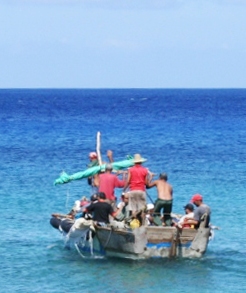
Cuban migrants travel on
 (CNS): Update 2:10pm — The 16 Cuban migrants who were intercepted in Cayman waters yesterday and again today, decided to continue their journey to another destination after refusing protection from the Cayman Islands Government, which, unless they asked for and were granted political asylum, would mean that they would be returned to Cuba under the terms of the MOU with the Cuban Government. Chief Immigration Officer Linda Evans said her officers and the joint Immigration/Customs/RCIPS Marine Unit communicated with the migrants, prior to their departure. A group (15 males and one female) arrived aboard a 21-foot vessel powered with a diesel engine this morning (Monday 7 February) off the coast of South Sound.
(CNS): Update 2:10pm — The 16 Cuban migrants who were intercepted in Cayman waters yesterday and again today, decided to continue their journey to another destination after refusing protection from the Cayman Islands Government, which, unless they asked for and were granted political asylum, would mean that they would be returned to Cuba under the terms of the MOU with the Cuban Government. Chief Immigration Officer Linda Evans said her officers and the joint Immigration/Customs/RCIPS Marine Unit communicated with the migrants, prior to their departure. A group (15 males and one female) arrived aboard a 21-foot vessel powered with a diesel engine this morning (Monday 7 February) off the coast of South Sound.
The Cubans were first intercepted on Sunday in the area of the Creek Dock in Cayman Brac. They proceeded to the “Panama Canal” inlet and explained they were in transit. Immigration and police officers had attended the scene until the vessel departed Cayman Brac at 11:30am. However, the boat was sighted again this morning moored off Prospect Point, and it subsequently moved to Jackson Point off South Sound, where it is was located when government officials issued confirmation of the migrants’ arrival.
The migrants are the first refugees to be intercepted by local immigration staff at sea since October 2009. Once a common occurrence in Cayman waters, the flow of Cuban migrants had stopped over the last year before this group of sixteen entered local waters on Sunday.
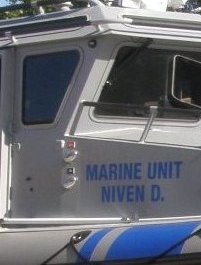
Cops consider sale of boats
 (CNS): The police Marine and AirSupport units have been working well together in the fight against crime, the commissioner recently revealed, but these valuable police assets may still be depleted. Speculation that the RCIPS could be selling some of its boats was not denied by a spokesperson last week, who confirmed an internal review had taken place. Police have said that any sale of marine unit assets will be considered in relation to the current strategic threats but boats could still be lost, despite the fact that the helicopter is being utilised in direct combination with vessels from the Marine Unit to intercept boats in Cayman waters that may be bringing in drugs and guns.
(CNS): The police Marine and AirSupport units have been working well together in the fight against crime, the commissioner recently revealed, but these valuable police assets may still be depleted. Speculation that the RCIPS could be selling some of its boats was not denied by a spokesperson last week, who confirmed an internal review had taken place. Police have said that any sale of marine unit assets will be considered in relation to the current strategic threats but boats could still be lost, despite the fact that the helicopter is being utilised in direct combination with vessels from the Marine Unit to intercept boats in Cayman waters that may be bringing in drugs and guns.
The cost of maintaining the helicopter, however, may be the reason why the RCIPS will lose some of those boats that are used in the actual interdiction of contraband.
“An independent review of the RCIPS was undertaken recently and as part of this the Marine Unit was subject to scrutiny,” a police spokesperson confirmed, adding that the review was more than a cost cutting exercise.
“Recommendations are being made to the Cabinet concerning RCIPS assets including the Marine Unit. No decisions have been reached and there are no current changes in fleet size or numbers of staff being undertaken. The sale of any marine assets must be considered in relation to the overall strategic threats relating to border security and the ability of the Cayman Islands Government and RCIPs to safeguard its Islands and its people.”
Both the governor and the police commissioner have consistently repeated recently that the elected government is willing to finance the police needs and that cuts impacting the rest of the public sector will not be allowed to undermine the resources the RCIPS needs to fight crime.
Speaking at both the Chamber meeting and the press briefing updating the public on the current crime statistics, Baines said Cayman is becoming a transshipment point in the drugs trade and, as a result, border control was becoming an increasingly important element in addressing the crime on island, with the need for solid marine support more important than ever.
The arrival of more drugs and guns from the United States and the wider region, the commissioner said, required an even greater crackdown at the country’s airport and seaport, backed up by the use of the helicopter and the police boats to intercept the vessels at sea that are being used by criminals to bring the contraband in and out of Cayman.
It is not known if the cost of flying and maintaining the helicopter, which is believed to be in excess of $1milllion per annum, is presenting an “either or” situation for the police, making officials examine what assets they can lose in order to keep the machine flying.
The police helicopter currently has one pilot directly employed by the RCIPS but a second pilot is expected to arrive next month. US based Arrow Aviation LLC, which was engaged in 2007 when the chopper was first purchased, are continuing to carry out the maintenance as the police said they have been unable to secure a contract through the CTC process. As a result, a decision has now been made, the police say, to employ their own maintenance engineers to look after the helicopter but it is not clear if this will see a reduction in running costs and save any of the marine fleet.

Miller queries review method of finance law
 (CNS): Although very pleased that government is finally taking on the need to change the law that governs public finances in Cayman, the chair of the Public Accounts Committee believes it should have been carried out by the country’s elected officials. Ezzard Miller said that bringing in an expensive UK consultant could result in something worse being imposed on the country rather than an improvement on the situation, which he believes a select committee of the Legislative Assembly would have been able to achieve. As representatives of the people and well aware of what needs to happen to make public finances more accountable, Miller said the MLAs could have taken an objective but practical approach to the legal changes required.
(CNS): Although very pleased that government is finally taking on the need to change the law that governs public finances in Cayman, the chair of the Public Accounts Committee believes it should have been carried out by the country’s elected officials. Ezzard Miller said that bringing in an expensive UK consultant could result in something worse being imposed on the country rather than an improvement on the situation, which he believes a select committee of the Legislative Assembly would have been able to achieve. As representatives of the people and well aware of what needs to happen to make public finances more accountable, Miller said the MLAs could have taken an objective but practical approach to the legal changes required.
Miller said that the FCO consultant who has been selected to review the law, Keith Luck, could have been brought in to assist a select committee and offer some professional advice rather than conducting a closed door review where he will hear only from civil servants who either love or hate the existing Public Management and Finance Law and will not have the benefit of the practical experience the LA has had in trying to utilise the law.
“Although I am glad that the law is finally being reviewed, I am not happy about the way it is being done,” Miller, who is chair of the legislative committee that oversees government financial accountability, told CNS. “While Mr Luck has an impressive CV, I would have preferred to see the review conducted by the whole committee of the House, which could hold public hearings and talk to civil servants directly … I think a lot would have come out of that approach.”
Miller said he feels the public sector employees who are dealing with the law on a day to day basis would be more comfortable talking to their own rather than a UK official. Instead, he lamented the fact that government has opted to “bring in an expert who will do doubt come with another set of solutions and tell us we need to spend x more million dollars to implement,” the independent MLA warned.
He estimated that the country had already spent in excess of $80 million over the years on the introduction of the PMFL and it could ill afford to waste more money introducing a new layer of bureaucracy. He said the PMFL was a colossal waste of money, especially in light of the fact that the public has less information today than it did under the old accounting system about what government spends and why.
“My fear is that bringing in a consultant we will run the same risk,” he said, adding that he hoped the review would not end up with yet another system being imposed on the country. Miller said it would be better for Luck to work with the country’s parliament to draft the legislation that would create the changes necessary to have transparent government accountants as they are well placed to know what is needed.
“As MLAs we are required to vote on the budget and scrutinise government spending, so we are in a position to decide how best the law can do that,” Miller added, stating that even he believed there were some good things about the law that needed to be preserved. He said the fundamental problem with the PMFL was the unnecessary and burdensome bureaucracy that was clouding the transparency it was meant to create.
Miller also noted that he would be pushing for some kind of accountability for those who are responsible for completing government accounts. “One of things I will fight for is that the administrative offence for non-performance will be enforced and the responsibility clear cut. If the law says accounts must be produced by a certain date and they are not then someone has broken the law and must be accountable,” he added.
The PAC chair said he had mixed feelings about the review, and while he hoped for new legislation that would work, he was fearful the country could end up with something worse.
Government announced last week that Luck, the former director general of finance at the FCO who undertook a review of its financial accounting, was on his way to Cayman to conduct a review of the law.
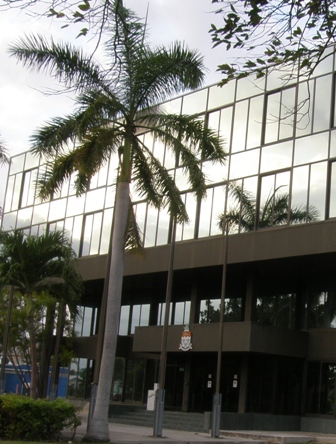
Glass House sick say reports
 (CNS): The move from the current government offices at the Glass House into the new accommodation can’t come too soon for some government workers who continue to complain of ill health. It appears staff have been breathing in mould and sewer gasses for many years, according to reports made public on the Lands and Survey website in its freedom of information disclosure log. The reports show that people have been complaining of serious illness for over a decade and environmental reports completed as recently as last year show the building is still home to some dangerous pathogens. Going back as far as 1998, government reports, which were kept confidential, say staff in the Glass House have been working in offices that could have made them ill.
(CNS): The move from the current government offices at the Glass House into the new accommodation can’t come too soon for some government workers who continue to complain of ill health. It appears staff have been breathing in mould and sewer gasses for many years, according to reports made public on the Lands and Survey website in its freedom of information disclosure log. The reports show that people have been complaining of serious illness for over a decade and environmental reports completed as recently as last year show the building is still home to some dangerous pathogens. Going back as far as 1998, government reports, which were kept confidential, say staff in the Glass House have been working in offices that could have made them ill.
Over the last twelve years government workers appear to have complained about suffering from ill-health while working in the Glass House and reports conducted as recently as last year reveal that not all of the problems have been addressed, with evidence of mould inside the building. The move to the new accommodation was set to take place last month but the need for various inspections has delayed the start of the transfer, which officials say will be completed in stages.
Although the various reports state there are no generally accepted guidelines for comparative levels of fungi and mould on the inside to the outside, the Glass House, when compared to outside levels of spore samples, have generally shown similar levels and species composition. However, in some cases the reports show that there appears to be high levels of mould in some offices.
One of the many reports that is now on the Lands and Survey website conducted by the DoEH in 2009 shows that one government employee who worked on the second floor in the Treasury Department had reported respiratory problems and when tested had shown a high level of allergy reaction to Aspergillus, one of a number of dangerous spores found in his office at “moderate” levels. In the summary of findings the report said that in the Treasury Offices there were several spots which showed mould growth typical of extended exposure to moisture and samples taken directly from the vent in the office indicated the possibility of contamination of the ducts.
CNS contacted the public servant in question to ask him what had happened as a result of the report but he said he could not comment on the situation as he was still a member of the civil service and was not able to talk to the press but he confirmed he had been moved from the Glass House.
The issue of health and safety at the thirty-year-old office block was raised back in 2005 when the Governor’s Office moved out because of inadequate fire escape provisions. After government decided it would build the new government office accommodation building a decision was made not to install a new fire escape. While questions of mould and other dangerous pathogens had been muted at that time, it was never confirmed by government that people were suffering from respiratory conditions as a result of working in the building. E-mails revealed in the disclosure log demonstrated that government officials knew there were problems in the building that could cause ill health and that there was a need for major engineering works to address the odours, mould and contamination in the air supply.
Although the new office accommodation building has been completed more or less on schedule, there have been some last minute delays. Government workers are now expected to begin the move this month. Given the revelations about the health concerns raised over the years about the real condition of the Glass House, the move to the modern, environmentally friendly building could see a marked improvement in the health and well being of the country’s civil service.